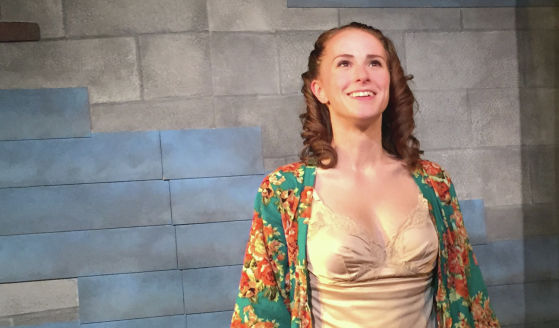
Our play is set in Hattiesburg, Mississippi, where the wall calendar reads 1958. However, before meeting the spunky narrator of The Summer of Daisy Fay, you ought to know: 1 ) that until the government programs of the 1960s, our country's Southern regions continued to suffer the economic devastation engendered by domestic conflicts ending a century earlier, 2 ) that young women had few options for escape to more progressive climes, and 3 ) that Fannie Flagg, author of the novel on which Ed Howard bases his solo play, witnessed first-hand many of the adventures she recounts through the voice of Daisy Fay Harper.
If you've never had similar experiences yourself, you might find some of these as hard to swallow as a sugarless julep. Take, for example, Daisy's tale of how she got her chipped tooth: We can believe that her alcoholic father, in a burst of paternal exuberance, might have swung his offspring face-first into a tree, but then there's the dental damage inflicted during a high school homecoming parade involving breaking into a locked storeroom to retrieve band uniforms and a marching musician's injured hand subsequently bleeding so profusely as to provoke a distressed twirler to launch her baton straight into the jaws of—yep, you guessed right. If you can accept this chain of events, then you will have no trouble with the notion of the irrepressible Daisy competing in the Miss Mississippi beauty pageant, sponsored by a banker rescued at a raid on a gay bar.
It's easy for urban audiences in 2015 to chortle at the antics of mid-twentieth-century Deep South denizens (often while piously censuring the proliferating of stereotypes). What's harder is to look past the screwball comedy to the hints of tragedy always lurking in the corners of poverty and parochialism: a wife institutionalized for striking out at her abusive husband. A teenage daughter impregnated by her controlling father. A disabled child kept sequestered by affluent parents. Small wonder that the ambitions of pretty girls should be channeled toward the scholarships to faraway schools in faraway cities awarded by purveyors of wholesome femininity to willing collaborators.
Charlie Irving inhabits the role of Daisy Fay with a conviction and authenticity transcending the division between actor and character. (No dialect instructor is credited in the playbill, making her accent all the more impressive.)
Under the direction of Anthony Whitaker, this New American Folk Theatre production makes for a briskly paced evening hosted by a Dixie Chick whose charming candor is tempered by polite warnings when salty language is imminent.
